Boldly Going
Members of TU's first-generation community share the stories of their collegiate journeys.
By Megan Bradshaw
Photographs by Alexander Wright ’18
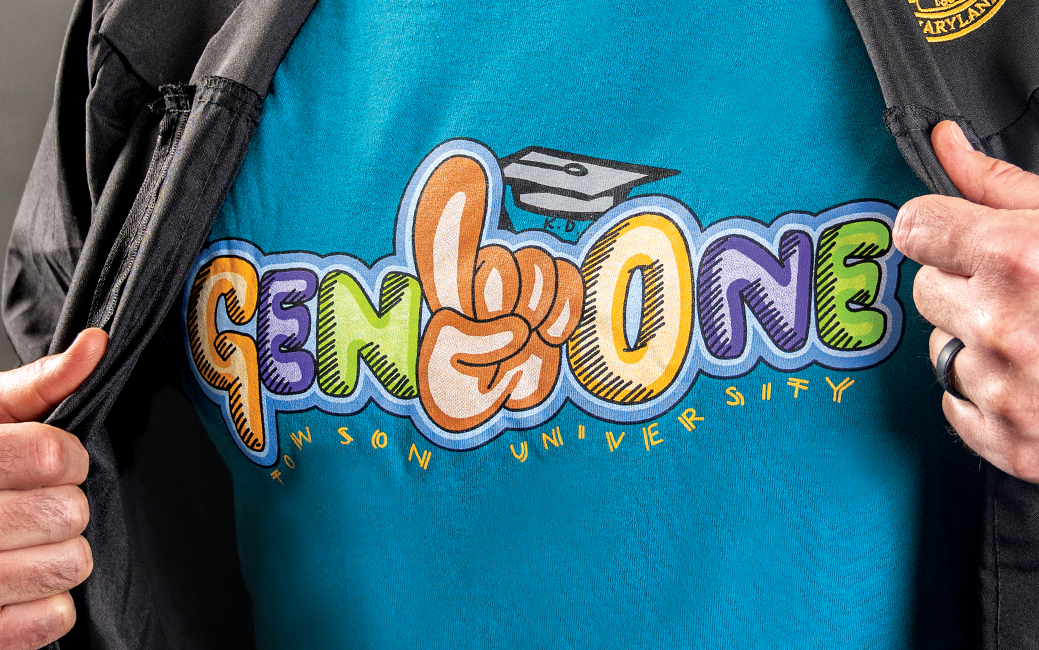
First-generation students and graduates have found their way to TU through a variety of paths: college visits, recommendations from friends and family and job opportunities. No matter how they arrived, it took lots of hard work for them to get here.
TU has made it a priority to support its first-generation students all the way through graduation, providing plenty of resources for current and future first-generation Tigers.
The Generation One and the Students Achieve Goals through Education (SAGE) programs provide first-generation college students tailored mentoring and guidance to foster academic and personal accomplishments as well as peer support. The College Readiness Outreach Program (CROP) connects Baltimore City ninth graders with TU student mentors for a series of college readiness workshops that build a solid plan for matriculating successfully through high school then college.
Each first-generation student has a unique story. Here are some of them.
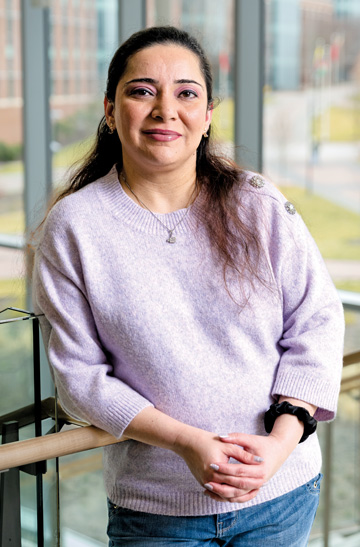
Atika Syed
Asian, Pacific Islander, Middle Eastern and Desi American Coordinator
Center for Student Diversity
I come from a family in Pakistan where education has always been extremely important. My parents were very particular about my sister and I getting as far as we could education-wise. But because I got married very young, that was interrupted.
When we moved here for my husband’s job, I was like, “It's time for me to restart my life here.”
I didn’t have a support system as such. With two young kids, it was tough. There were points where I thought I should go part-time, take a semester off. But I forged on. In two and a half years, I finished my undergrad at Penn State, and I started grad school next semester. Then I went part-time and completed it in three years.
It was all because from the very beginning, it was instilled into us that education is extremely important. And it doesn't matter how you identify, what you identify as. If there's one unifier, that is education.
Being a mature student, it was twice as hard. But I never found that intimidating or felt like I needed to hold back because my opinions and thoughts were always valued there.
Trying to navigate the space with the multiple, marginalized identities I have was also quite something. Being oftentimes the only Muslim woman of color in the class, viewing things from a different lens and trying to find the words to express those thoughts…
I learned I am stronger and more determined than I thought. We are our own greatest critics. There's this guilt that keeps gnawing at us, but I learned to put that to sleep. I believed my kids when they said I was a good mom and they were happy and proud of me. That was a huge motivator.
The other wonderful thing was self-awareness and how to carry all my identities and protect them. I come from a country where race is not an issue when it comes to social justice.
Learning what covert and overt racism looks and sounds like is very important to me. How to respond to that is also something that I learned along the way. My kids’ experiences are what took me on the path to DEI (diversity, equity and inclusion). A lot of what shaped me into who I am today came from the educational journey I'm on.
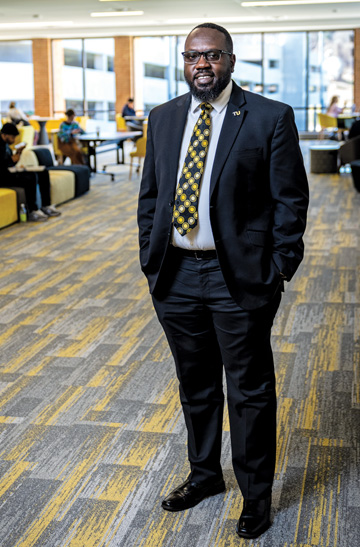
Vernon J. Hurte
Vice President for Student Affairs
Division of Student Affairs
I'm from Central Virginia. My family on my grandmother's and grandfather's sides are from Nottoway and the Amelia County area—so a very rural background.
My grandparents were very active in the community and focused on education. From the time I can remember, the idea of going to college was always planted, even if I didn't necessarily have the path clearly laid out for me or have someone to go before me to complete college.
My grandfather was a role model. He started working for a bank after high school, as a janitor, and when he retired from what is now Bank of America, he was a vice president. His drive, his wisdom was always an inspiration.
I was fortunate to have some great teachers in high school, some great mentors. I had a teacher named Jan Westbrook who would allow me to hang out with her between classes and after school, and I would constantly get advice from her.
Trying to identify colleges was a challenge for me. I didn't know what I was looking for. I ended up going to Bowie State University, and that was largely influenced by my AP English teacher in high school, Dennis Reed.
It felt like home. It was just a great location, a real sense of community. I felt inspired and even challenged, particularly by Dr. Mary McManus, an English professor and director of the honors college. There were a number of folks who really embraced me from my RA Dale Funny, who, 25 years later, I still remember. Renardo Hall was the director of housing at the time, and when I was having challenging days, he would find a way to lighten those moments with a joke or something.
Being surrounded by supportive people—people who want to see you succeed—is such a critical part of the college journey, especially for first-generation students. Confidence is boosted when you know there are folks in the community who are really invested in your success.
My undergraduate experience inspired me to go into higher education and work to create that type of experience for all our students, but particularly for students who are first-generation and may be coming from challenging backgrounds, students who may not have always seen themselves as college students—or college graduates—to see opportunity and really be able to flourish and thrive.
I'm very proud of my identity as a first-gen student, first-gen college graduate and I'm very proud of the students we have here. Seeing the positive impact they’re having on not just campus but the whole region and hearing the stories of success and where students are going after they leave TU is something I'm very proud of.
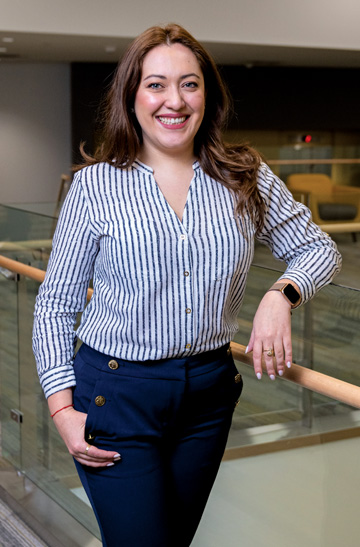
Alejandra Balcázar
Latine/x and Undocumented Student Coordinator
Center for Student Diversity
I am originally from Bogota, Colombia. My mom was a CEO in a small company. She was working a lot of the time. But she was very present at the same time.
My mom set me up to be independent. Something she did, which was sneaky but now I really appreciate, when I was 4 or 5, she told me the Disney Channel didn’t exist in Spanish. She made me watch cartoons in English. She jokes now, “Yeah, I could have put it in Spanish, but why?”
My grandma also had a big influence on me because after school, I would come home, and my grandma would be there, cooking dinner for us. And then my mom would come around 5:30. And it was 100% me time—helping me with homework, playing or teaching me other things.
My mom could not afford to go to college, but she was always a very hard worker. When I started looking for colleges, I was not sure what I wanted to study. But I knew what college I wanted.
At 16, I started studying modern languages in Colombia, at Javeriana University, where I learned four languages, which I use a lot. When I came here, I could not start working in education, which was a big shock because back in Colombia, I already had my degree. I was working in a trilingual school.
But then when I moved here, they told me that because I didn't learn with the Common Core, I couldn't teach. I couldn't get my certificate. So my degree was not valid.
I learned, depending on where you are, that sometimes it doesn't matter the knowledge you have, the actual certificate or transcripts do. I spent more than $200 to bring my transcripts, to explain I studied modern languages, which is the equivalent to a particular certificate. Explaining myself was very hard.
I started at TU as a Latine/x and undocumented student coordinator in January. The Latine/x students are so passionate and so positive. That gives me joy. On the other hand, working with undocumented students, whose day-to-day reality is so different, has been a good challenge, due to the fear of not knowing how the policies are going to change. I want to give back and support communities that do not have that support. I acknowledge it was a privilege I had in that moment. I want to do something with that.
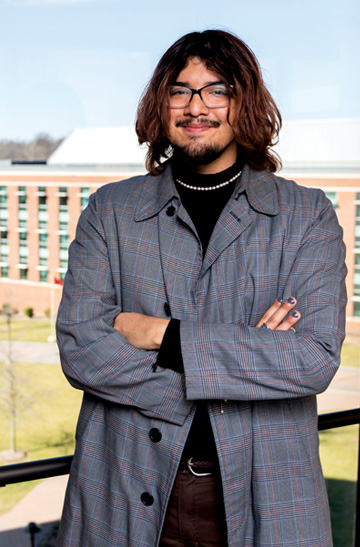
Anthony Landaverde ’24
Early Childhood and Special Education
College of Education
My parents are originally from El Salvador, a small, rural town called Chalatenango. When I was little, I couldn't speak English or Spanish. I went to speech therapy, and then when elementary school came, I had ESOL (English as a Second Language) until fifth grade. I had an IEP (individualized education program) in middle school, and I had a 504 plan to provide accommodations in high school.
The language barrier for receiving help in school was a bit difficult. My special ed teacher, Mr. Lebar, was a big help. I loved him because when I was in sixth grade, I was very shy. He helped me open up more. I was getting better in school, and I remember my mom would go to IEP meetings and just cry because she saw all the progress I was making.
Towson was my first choice from the get-go because I had a cousin who came here. She graduated with a degree in accounting, and she loved Towson.
I chose my major because I believe in early intervention. If you help children as soon as possible, it’s the best for the long run. I understand how it is to be in their shoes, especially from having parents who are immigrants as well—our native language is not English. I can understand the parents’ point of view now.
I can understand the students’ point of view too. Being taken out of class for meetings or having accommodations can be intimidating for students because they’re getting accommodations everyone doesn’t. It can make you feel like an outsider. If I do go the special education teacher route, I can help my students feel more of a pride about it rather than be worried.
I have a couple goals: to be a school psychologist, an ESOL teacher or something to do with spreading more representation into schools. This semester, I made my own student org called LEO, Latinx Educator Organization. It helps anyone who wants to be a teacher or anyone who wants to work in the school setting.
I would tell a student considering TU to get involved. You can find yourself a lot in orgs, and you feel at home. It is a great way to know people on campus and have fun. I have gone to Gen One meetings. I really liked the stuff they were planning. I feel like it helps a lot of students. And SAGE— Alexia Crawley has helped me a lot as well. She got me interested in it and, last semester, when I was going through some things, she was there for me. I also loved it because I had mentees who were also education majors and helping them has helped my leadership development and how I have grown as a person.
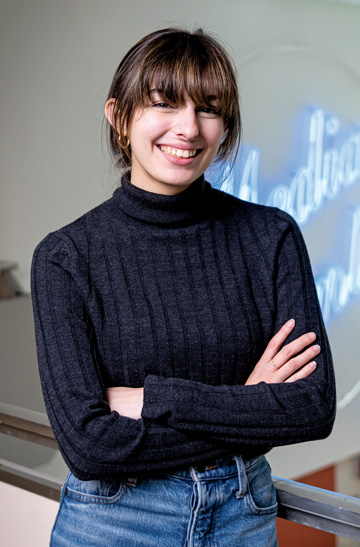
Ariana Maturi ’23
Mass Communication
College of Fine Arts and Communication
I wasn't 1,000% sure I was going to go to college when I was in high school. I went to a private Catholic school, and they were very big on college prep. As soon as I came in as a freshman, they were like, “We're going to prep you for college.” I was like, “Oh, I didn't think about that.” But the more I looked into it, the more I realized it was for me. I thought I was going to do something in the medical field. But I realized my senior year I was way better with more creative stuff, like media and writing and English.
I come from a very traditional family—my parents wanted me to be close to home. I was looking at schools in New Jersey and New York, but when I decided I wanted to do media, I realized those schools didn't really have any programs I loved. My sister’s boss told me about Towson, saying, "They're one of those schools that have almost every major you could think of. You should really check out that school.”
I was excited about going to college. But I feel like I did come in blindly. I was so terrified on my first day. I couldn't believe that I did it: I applied, I got accepted, I enrolled and now here I am moving in to Tower B.
Freshman year was a little all over the place. I remember the first time I met with my adviser, and she started explaining things to me. Every few sentences I had to be like, “Whoa, wait, what does this mean?”
I did join a club. I was part of Actors Anonymous, so I made friends with some older students who had been at Towson longer than me. We did Carrie, and that was really fun. It helped me make friends. Once I made friends and started getting adjusted to living on campus, I was like, “I'm living like this now. This is where I live, this is how I live. This is okay.”
I feel like I’m a completely different person after these four years. I’ve become more outgoing. When I came into college my freshman year, I was so painfully shy. I’ve become much more comfortable in academic spaces. I've been much better at having a presence in the classroom, at work, in social settings.
My goal when I graduate is to land a job in Manhattan. I'm hoping to stay in media. I often look at jobs in broadcast journalism. I’ve also been doing social media for the university. I look at social media positions in New York as well.
I get excited because when I look at the job qualifications, I see, “I’ve done that before. I have experience in that.” I feel like I could totally land a good job.
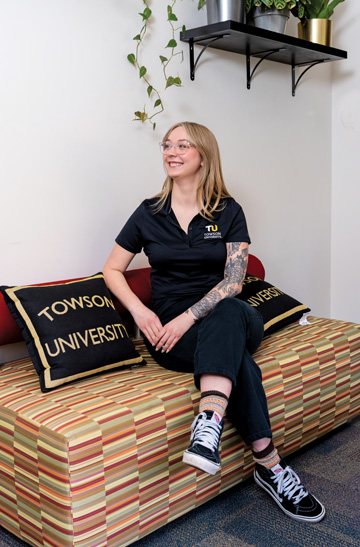
Jenna Hess ’23
Business
College of Business and Economics
I was in the Air Force for four years. In June 2020, I separated from the military to do a skill bridge program where they let you discharge six months early to do an internship that helps you transition to civilian life.
I am pretty sure I only applied to Towson. Sometimes I’m stubborn, like, “I want this. I don’t want anything else.”
Project management, supply chain and strategic management were interesting to me. I’d like to work on a team. I’ve learned all these valuable things about businesses and business concepts you can apply to any industry, and I’ve heard from so many different types of people. It was priceless. When I graduate, it’s not going to feel like I’m doing this without a net underneath me.
One of my professors had a ton of guest speakers. I felt like that was really valuable because project management’s one of those things where it’s really hard to sit and talk about. You have to go out and do it. And that’s something the professors at TU understand.
I’m a work study student at the Military and Veterans Center (MVC) on campus, and my internship is with Sodexo. I’m a future leader intern in the human resources department. I want to do food supply chain, whether that be human resources or facility management in Sodexo. Food is cool and fun, and it brings people together.
I've found the MVC to be my launch pad for every day. It’s been very calm. I thought school was going to be very stressful, but I feel like I’ve gotten a handle on it. And a lot of it’s been through the help of the MVC. As a student veteran, I do feel taken care of by the school.
Advice I’d have for other first-generation students is Google everything. I tried to be as proactive as possible so that I didn’t face getting emails from the bursars or admissions or [ones saying] you’re not going to graduate on time. As first generation, I couldn’t call my dad and be like, “Hey, how does admissions work?”
Towson has done everything they promised, which was to set me on a path to get a degree, and that’s all I wanted.
learn more
Start your journey now
Visit our students success programs website to learn more about resources for first-generation college students and applicants.
